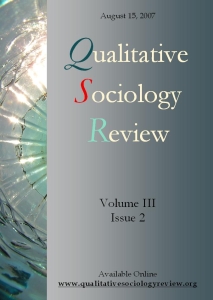On Cooling the Tourist Out Notes on the Management of Spoiled Expectations
DOI:
https://doi.org/10.18778/1733-8077.3.2.04Keywords:
Cooling out, Eco-tourism, Goffman, Science studies, Social construction of experience, Tour guides, Tourism, Narrative, Whale watching, NaturalistsAbstract
This article focuses on the social world of the commercial whale watch cruise. It draws on several years of participant observation research with marine field scientists, particularly field scientists who serve as naturalists on commercial whale watch cruises. Using Erving Goffman’s work, the essay details how the naturalist’s narration is an example of “cooling the mark out” that Goffman conceptually outlined and others have explored. In the social world of the commercial whale watch, the naturalist is the “operator and the tourist the mark”. It is argued that the naturalist’s narration is the principal means for cooling the tourists’ out. This is done within a context of the operator anticipating a set of spoiled expectations the tourist is likely to experience. While this essay extends the work of Goffman and others who have explored different settings of the cooling out process, it substantially differs from them. Past studies have focused on the cooling out process primarily within a context of individual face-to-face interaction. This essay looks at the commercial whale watch as a social setting of cooling out the mark not on a face-to-face basis but as a process of a “group of individuals who are being “cooled”. Most importantly, this is viewed as occurring not after they have been conned or duped but in anticipation of their likely experiencing a set of spoiled expectations.
Downloads
References
Becker, Howard S. (1976) “Art Worlds and Social Types.” American Behavioral Scientist 19:703-718.
Google Scholar
DOI: https://doi.org/10.1177/000276427601900603
Clark, Burton R. (1960) “The ‘Cooling-Out’ function in Higher Education.” American Journal of Sociology LXV (6):569-576.
Google Scholar
DOI: https://doi.org/10.1086/222787
Clarke, Adele E. and Joan H. Fujimura, editors (1992) The Right Tools for the Job: At work in Twentieth-Century Life Sciences. Princeton: Princeton University Press.
Google Scholar
DOI: https://doi.org/10.1515/9781400863136
Collins, H.M. (1983) “The Sociology of Scientific Knowledge: Studies of Contemporary Science.” Annual Review of Sociology 9:265-85.
Google Scholar
DOI: https://doi.org/10.1146/annurev.so.09.080183.001405
Collins, H.M. and Robert Evans (2002) The Third Wave of Science Studies: Studies of Expertise and Experience.” Social Studies of Science 32 (2):235-296.
Google Scholar
DOI: https://doi.org/10.1177/0306312702032002003
Davis, Susan G. (1997) Spectacular Nature: Corporate Culture and the Sea World Experience. Berkeley: University of California Press.
Google Scholar
DOI: https://doi.org/10.1525/9780520919532
Goffman, Erving (1952) “On Cooling the Mark Out: Some Aspects of Adaptation to Failure.” Journal for the Study of Interpersonal Processes 4:451-463.
Google Scholar
DOI: https://doi.org/10.1080/00332747.1952.11022896
Goffman, Erving (1959) The Presentation of Self in Everyday Life. Garden City, NY: Anchor Books.
Google Scholar
Goffman, Erving (1961) Asylums. Garden City, NY: Anchor Books.
Google Scholar
Goffman, Erving (1963) Stigma. Englewood Cliffs, NJ: Prentice-Hall.
Google Scholar
Goffman, Erving (1966) Behavior in Public Places. New York: The Free Press.
Google Scholar
Hewitt, John P. and Randall Stokes (1975) “Disclaimers.” American Sociological Review 40:1-11.
Google Scholar
DOI: https://doi.org/10.2307/2094442
Holyfield, Lori (1999) “Manufacturing Adventure: The Buying and Selling of Emotions.” Journal of Contemporary Ethnography 1:3-32.
Google Scholar
DOI: https://doi.org/10.1177/089124199129023352
Lynch, Michael (1997) Scientific practice and ordinary action: Ethnomethodology and social studies of science. Cambridge: Cambridge University Press.
Google Scholar
MacCannell, Dean (1973) “Staged Authenticity: Arrangements of Social Space In Tourist Settings.” American Journal of Sociology 79:589-603.
Google Scholar
DOI: https://doi.org/10.1086/225585
MacCannell, Dean (1976) The Tourist: A New Theory of the Leisure Class. New York: Schocken Books.
Google Scholar
Maynard, Douglas W. and Nora Cate Schaeffer (2000) “Toward a Sociology of Social Scientific Knowledge.” Social Studies of Science 30 (3):323-370.
Google Scholar
DOI: https://doi.org/10.1177/030631200030003001
McKegney, Doug (1980) “Situation, communication, and use: The roots of scientific knowledge.” M.A. thesis, Department of Communication, Simon Fraser University, Canada.
Google Scholar
Miller, Michael V. and Cherylon Robinson (2004) “Managing the Disappointment of Job Termination: Outplacement as a Cooling-Out Device.” The Journal of Applied Behavioral Science 1:49-65.
Google Scholar
DOI: https://doi.org/10.1177/0021886304263848
Mulkay, Michael (1978) “Consensus in Science.” Social Science Information 17(1):107-122.
Google Scholar
DOI: https://doi.org/10.1177/053901847801700106
Mulkay, Michael (1983) Science and the Sociology of Knowledge. London: George Allen and Unwin.
Google Scholar
Nutch, Frank (1996) “Gadgets, Gizmos, and Instruments: Science for the Tinkering.” Science, Technology, and Human Values 2 (Spring):214-228.
Google Scholar
DOI: https://doi.org/10.1177/016224399602100205
Pasko, Lisa (2002) “Naked Power: The Practice of Stripping as a Confidence Game.” Sexualities 5(1):49-66.
Google Scholar
DOI: https://doi.org/10.1177/1363460702005001003
Roth, Wolff-Michael and G. Michael Bowen (1999) “Digitizing Lizards: The Topology of ‘Vision’ in Ecological Fieldwork.” Social Studies of Science 29 (5):719-764.
Google Scholar
DOI: https://doi.org/10.1177/030631299029005003
Scott, Marvin B. and Stanford M. Lyman (1968) “Accounts.” American Sociological Review 33:46-62.
Google Scholar
DOI: https://doi.org/10.2307/2092239
Snow, David A., Cherylon Robinson and Patricia McCall (1991) “Cooling Out” Men In Singles Bars and Nightclubs. Journal of Contemporary Ethnography 4:423-449.
Google Scholar
DOI: https://doi.org/10.1177/089124191019004003
Urry, John (1990) The Tourist Gaze: Leisure and Travel in Contemporary Societies. London: Sage Publications.
Google Scholar
Wajcman, Judy (2002) “Addressing Technological Change: The Challenge to Social Theory.” Current Sociology 50 (3):347-363.
Google Scholar
DOI: https://doi.org/10.1177/0011392102050003004
Walton, Richard E. and Donald P. Warwick (1973) “The Ethics of Organization Development.” The Journal of Applied Behavioral Science 9 (6):681-698.
Google Scholar
DOI: https://doi.org/10.1177/002188637300900603
Downloads
Published
How to Cite
Issue
Section
License

This work is licensed under a Creative Commons Attribution-NonCommercial-NoDerivatives 4.0 International License.











